Benefits of Synesthesia Mediation – increase your life quality!
Practicing Synesthesie Meditation on a regular base promises many different benefits. By training your mind you will you reshape your brain and will enjoy a more happy life. There are many scientific studies that document those benefits. In this article we will summarize the benefits of Synesthesia Meditation.
There are many different types of Meditations. Our approach, Synesthesia Meditation, is a mix between traditional mindfulness techniques and synesthetic experiences.
Synesthetic perceptions require attention and mindfulness is the process of shifting and sustaining attention on the perceptions in the present moment. It helps you to increase your mindful synesthetic awareness in daily life.
A consistent practise is crucial to enjoy the benefits of Synesthesia Meditation.
Sitting down 10 minutes every day and listening to Synesthesia Meditation is quite a commitment. You are likely busy with many other things in your life. Establishing a habit is a lot of work. So why should you do it?
A constant routine will change how you approach life, how personally take things and how you interact with others. It will allow you to see the world including yourself more clearly. It reduces stress, cultivates a sense of calm and improves cognitive functions of your brain.
There are many good reasons how it will improve your overall life quality and bring you more happiness. Talking about the benefits of Synesthesia Meditation, it sounds like a “fix for all” solution. You may be sceptical of these claims on how Synesthesia Meditation beneficial to all these aspects of life. But it does work. Science is on our side. Synesthesia & Meditation have both a lot to offer.
Given the time you probably spend doing things that do not contribute to your general happiness, such as commuting or spending your time in front of screen. Spending 10 minutes per day to improve your quality of life, is worth it.
Why should you do Synesthesia Meditation on a regular base?
Researching the benefits of Mindfulness Meditation and the advantages of Synesthesia you will see, that it is almost too good to be true!
Synesthesia Meditation will change the structure of your brain, for the good. But this process is reverted, if you do not put the effort into doing it on a regular base.
Nevertheless, science has made a long way and discovered a lot of good reasons why you should do Synesthesia Meditation. And why it is worth to invest some time to increase your mindful synesthetic awareness.

The health benefits of mindfulness and Synesthesia can be summarized according to this study. Here are the main benefits:
- Synesthetic experiences and awareness in daily life!
- Cognitive advantages (memory, creativity, learning language)
- Body & sensory Awareness (be more aware of yourself and your surrounding)
- Self Awareness (relationship with yourself and others)
- Regulation of emotion (less Stress, less anxiety, more balance, better sleep)
- Regulation of attention (be in the here and now)
- Physical health benefits (less stress related illnesses, increased longevity)
There are many benefits! Did you know that mindfulness meditation has the potential to change your DNA. It could potentially contribute for a longer life!
Crazy stuff! You may think.
I did not believe it either. Until I read the scientific papers about it. But I am going too fast.
Stick with me as we go through the different benefits you can gain by simply listening to 10 minutes of Synesthesia Meditation per day.
Disclaimer: Both, the research on Meditation and Synesthesia are in its infancy. Though new insights are euphorically reported by press and media, there are still open questions the mechanisms in Meditation and as well Synesthesia.
Sensory Awareness – be in the here and now
Are there benefits of sensory awareness or are they actually tied to cognitive benefits? Yes, both are true! So let’s talk about the benefits of sensory awareness

Mindful Synesthetic awareness
To become aware of your synesthetic gift in daily life is already a benefit in itself .
Many people that have synesthesia do not perceive it consciously. It is hidden for them because they do not give attention to it. They miss the beauty of their synesthetic gift.
With an investment into your sensory awareness, you become more aware of each presents-moments’ synesthetic perception. Synesthesia Meditation trains your mind to regulate, shift and sustain attention.
Become aware of synesthetic experiences in your daily life.
You get more out of the experiences that surround you, such as music, food or sensual perceptions.
Increase your intentional engagement. Train to sustain attention on pleasurable stimuli without your mind wandering off immediately. Your will be more engaged with your senses to music, eating or massages, to name a few. Find more joy in your reality in the here and now.
On a walk in nature, do not let your mind confine your reality into the past and the future. Be here. Feel your legs walking, the birds singing and smell the flowers in colors.
A study claims that meditators cultivate synesthesia. And another study states that practicing meditation increases the engagement and flow of musical experiences.
Cognitive advantages of Synesthesia and Meditation
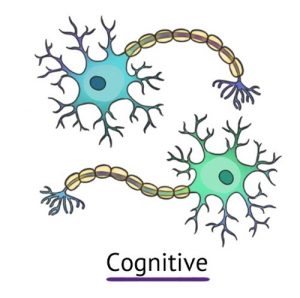
There are several cognitive advantaged tied to synesthesia and mindfulness meditation. It may help to positively influence attention, focus, improve working memory, boost creativity and give support in learning a language, to name a few. One study found that already 4 days of mindfulness meditation training can promote benefit on a range of cognitive tasks.
Synesthesia researchers J.Simner and E. Hubbard state:
“Synesthesia is associated with many cognitive benefits. Synesthetes can be more creative, have better perception, better memories and are gifted in many ways.”
People with Synesthesia tend to have an increased “Intelligence”.
In one study that examined synesthetes, they did a “IQ test”. They found that synesthetes scored better in such tests. Nevertheless, synesthetes did not generally have a higher education level, though there was a tendency towards that.
A Synesthesia Training study, where non-synesthetes learned letter-color associations in a course of 9 weeks, they found cognitive improvements, such as a temporarily increase of an IQ.
Learning and working memory skills
Both synesthesia and mindfulness meditation are associated with an improved, sometimes with a “superior” memory.
Even though there are some known synesthetes with a truly extraordinary memory, most people with synesthesia are not savants.
Several studies have shown that synesthetes showed an impressive memory performance, though not in all experiments. Some scientist prefer to refer to “alternative learning strategies” than to “superior memory”.
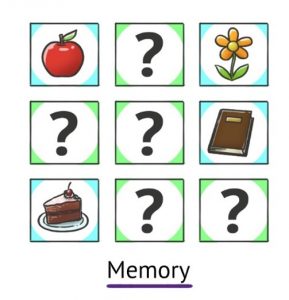
On the Mindfulness Meditation side, it has been reported that it enhances numerous mental abilities including rapid memory recall and higher working memory capacity.
Wrapping it up: synesthetes seem to have a tendency for improved memory skill that can be even more amplified with mindfulness meditation. The combination of Synesthesia and Meditation promises to be quite powerful.
Synesthesia supports Learning languages
Synesthesia is tied to alternative learning strategies that can improve working memory. As a very direct application, synesthesia may help you to learn languages.
Learning vocabulary is crucial for learning new language.
But it can be a boring task.
It has been shown that synesthetic correlations facilitate learning new words. Letters have colors for many synesthetes. Words may consists of colored letters, building up a color code and so, a mnemonic aid. Involving synesthetic colors, may help you to memorize and retrieve vocabulary!

Use synesthetic colors to learn grammer and new scripts
In a study, grapheme-color synesthetes and non-synesthetes learned an artificial grammar. Synesthetes showed a better performance to learn this grammar than the control group. This could indicate that synesthesia enhances memory performance relating to unconscious knowledge.
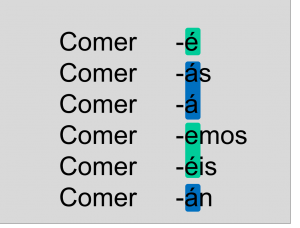
What about learning a new script language? A study has found something very interesting. Synesthetic participants had to learn an old germanic script. The synesthetic colors of the latin script transferred quite fast onto the new script system. After about 10 minutes the letters of the old germanic script were perceived in colors. This is called cross linguistic transfer. Are you learning a new script such as Hebrew? Well, your synesthetic color may help you achieve that!

There are not (yet) studies available that investigate the effects of mindfulness meditation on learning a language. But what seems clear so far is that with mindfulness meditation you gain increased memory capacities, more concentration and attention and less distraction. And these are components and skills needed to successfully learn a new language.
Development of synesthesia due to learning language?
A new study shows that in Czech the prevalence of synesthetes may be higher than in Canada. The explanation for this was that Czech students need to learn second languages in school. It is hypothesised that children facing learning challenges, such as learning a second language may lead to the development of synesthesia.
So, synesthesia helps to learn language. Maybe synesthesia sometimes develops for this reason: to learn languages. But more research is needed to clarify this hypothesis.
Explore your synesthetic abilities and enjoy the benefits.
With Synesthesia Meditation you become more aware of your synesthetic abilities in your daily life. In the Sensorium you can explore your synesthetic senses and get hints and tips on how to apply them in learning tasks.
If you want to become aware of your synesthetic experiences of letters and numbers, try it out in the Sensorium! There you find 10 minutes exercises to help you to become aware of it. You will get also some insights how to use your synesthetic abilities for learning languages or math.
Creativity
Creativity is the process of generating novel associations. A study demonstrated that people with synesthesia are more likely to be engaged in the creative arts.
People with synesthesia tend to score higher on some, but not all, tests of creativity. Creativity is not just a capacity that is required to work in art. Many other professions, such as science, involve creative thinking.
It seems as if, due to the “synesthetic cross connections” different concepts are combined more easily, leading to improved thinking. Some scientists go even so far as to say that the “synesthesia gene” may have evolved due to improved creativity. But this is also a hypothesis and further research is needed.
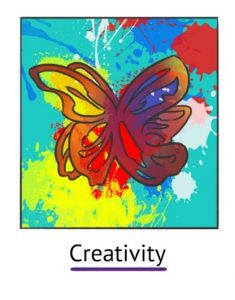
A study has shown that students who underwent 7 days of mindfulness meditation for 30 minutes have shown an improved creative performance.
Another study found that the “ability to carefully observe, notice, or attend to a variety of internal and external phenomena” enhanced creativity. “Meditation promotes insightful problem-solving by keeping people in a mindful and alert conscious state.“
Both, synesthesia and mindfulness meditation are independently associated with increased creativity. So let’s not miss those benefits of resonating with synesthesia!
Emotional regulation
We all know this feeling of being wrapped up in our emotions. Sometimes we are moody, irritable, or overly enthusiastic. This is not necessarily something negative, but it can also be challenging at certain times. We are not our thoughts nor are we our emotions.
Synesthesia Meditation helps to control emotional responses. It is beneficial to step back and observe your emotions. Synesthetic Mindfulness involves training a nonjudgmental attention to present-moment experiences and emotions.
Perceive emotions in colors and shapes
Emotion – Synesthetes have the ability to perceive emotions in a synesthetic way, such as shapes and color. Shifting attention onto emotions and perceiving their colors is a powerful technique to observe them in a synesthetic manner without judging them. You will find more inner balance and peace with this approach
Perceiving emotions In a non-judgmental way helps to cope with them and softens their properties. It may increase tolerance of negative effect on you and improved well being.
A study shows that the area in the brain that is responsible for processing emotional stimuli (called the amygdala) had a decreased activity for people that meditate, leading to less anxiety. Study participants showed also better moods after practicing meditation.
Synesthesia Meditation changes your reaction towards feelings, moods and emotions.
A regular practise may result in enduring, beneficial changes in the brain. Especially those areas of emotional processing. See it as a volume knob for your emotions that allows you to influence emotional processing. Even When You’re Not Meditating.
Less Stress and anxiety
We all experience stress from time to time. And being a little bit stressed is associated even with some health benefits. But too much stress is not healthy at all. Stress related health issues are increasing worldwide. It is a hectic time.
One study that reviewed scientific articles on the effect of mindfulness meditation on stress. Mindfulness meditation changes psychological or physiological effects to stress in a positive way.
Stress and as well worrying and rumination over past or future events prolong cortisol release. Cortisol is a hormone released as a reaction to stress that lowers the activity of the immune system. This has a negative effect on physical health. Mindfulness may influence cortisol release.
Synesthesia meditation reduces your stress level for an improved well being.
The amygdala is a center in our brain, responsible for emotional processing. This is the “fight-or-flight-area” or the “fear center”. When you are anxious, stressed or in fear, this area is activated. It has been shown that meditation leads to a decreased gray-matter density in this area. In other words, the amygdala becomes less powerful! And you perceive less stress, fear and anxiety.
Physical and mental Health
Research on mindfulness meditation has shown many physical help benefit. It seems to lower blood pressure, to boost the immune system and improve brain function. It also may minimize pain sensitivity.
In a study examining Mindfulness Programs In Schools found a reduction of Symptoms Of Depression Among Adolescents.
So you see, science confirms that practicing mindful synesthetic experiences are healthy for your mind.
Better Sleep
A lack of sleep is associated with many health problems such as obesity, high blood pressure and diabetes. In short, a constant lack of sleep may shorten your life expectancy.
The national health service states that around one third of population have trouble falling asleep. One out of ten may be affected by chronic insomnia.
Mindfulness Meditation may help to find better sleep. A study concluded that meditation could be an alternative treatment for chronic insomnia.

Relationships with yourself and with others
Emotional intelligence – empathy – compassion

Emotional intelligence is the capacity to be aware of emotions and gain control over them. It supports you in expressing emotions, and how apply empathy to your interpersonal relationships. Meditation boosts compassion.
Regular meditation helps us to put ourselves in another person’s situation. It increases the ability to feel empathy and compassion for the people that surrounds us. Scientists have found, that this is due to increased connection between parts of the brain involved in empathy and the part of the brain involved in processing information related to people that are “not like us”.
Regular mindfulness meditation involves paying attention to your experiences in the present moment in a non-evaluative way. This practise serves as a path to self-knowledge and self-regulation.
So with a regular practise of Synesthesia Meditation you enhance your compassion, become more self reflective and consequently you improve the relationships with yourself and the people that surround you.
Reshaping of the plastic Brain
The benefits are caused by a reshaping of the brain structure. Several studies show that practicing meditation reshapes the brain. In certain areas of the brain, white matter changes and / or grey matter became more dense. Certain areas of the brain become more strongly connected while other, rather malignant, connections get weaker.
There is emerging evidence that mindfulness meditation changes the brain in structure and function. Research shows that meditation has a powerful impact upon regions of the brain associated with stress, empathy, and sense of self. Areas associated with attention, sensory and emotional integration where thickened. Other areas associated with learning and memory showed an increased neuronal density. The same is true for brain regions connected to self-awareness, compassion and introspection.
Increase neuronal density
By Practising meditation, you can play an active role in changing your brain resulting in an increase of well being and quality of life.
Change in DNA – Longevity
And as a last benefit, meditation may influence your DNA and affect positively your longevity. How should this work?
Imagine it like this: Our DNA has “caps” on its both ends. The name of these “caps” is telomeres. They protect the DNA from becoming shorter at the ends. The older we get, the shorter these caps become. This leads to an interference with cell replication and, consequently, age related issues. Said simply, maintaining long telomere caps on DNA slows down aging.
There has been one study that found that meditation has a positive effect on the “renewal” of these telomere caps and the immune cell longevity. As a conclusion, practicing meditation could possibly prolong your life.
Sounds great, doesn’t it? But also here, we need more research.
Daily Practice is Important
With a daily practice you can change your brain and gain many benefits.
However, to maintain this benefits of Synesthesia Mediation, you have to continue meditating.
Why? Because the brain can easily change back to its old structure if you allow it. The brain is plastic. You will need to keep meditating to be sure the new neural pathways that you worked on stay strong.
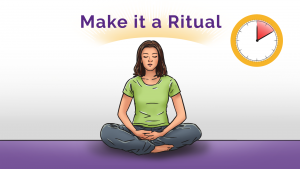
This brain science and the rewards that you can gain from Synesthesia Meditation provide compelling arguments to develop and maintain a daily practise. If you do not feel like practicing on certain days, recall the potential benefits that you can gain with only 10 minutes per day. Develop and keep strong the newly formed neuronal connections and get rid of unhelpful ones.
So, now it is time to start. In the gateway you find over a dozen free exercises to start you Synesthesia Meditation journey. Begin today and you will soon feel the benefits.

